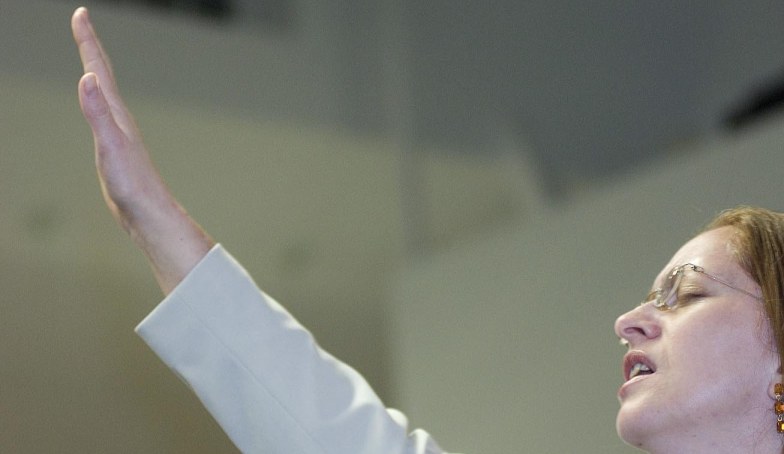 Nayra Pedrini da Silva is Pastor of the Igreja Apostolica Unidade em Cristo in the large municipality of Ilha do Governador near Rio de Janeiro’s International airport.
Nayra Pedrini da Silva is Pastor of the Igreja Apostolica Unidade em Cristo in the large municipality of Ilha do Governador near Rio de Janeiro’s International airport.
The location suits her well because Nayra travels a great deal. In fact, I first met her in Israel, leading a group of future evangelical leaders on a tour of holy sites, and explaining at each one the Old and New Testament sources of its significance.
She travels frequently to Florida and to Japan, where many years ago her church planted an affiliate. Recently, on her way to Israel, she and her group stopped off in Dubai to spend some time at prayer in the desert. Brazilians are welcome everywhere: who else can hop merrily from one Middle Eastern country to another as if there were no wars, no hatreds? (Only our beloved Home Secretary wants to make it harder for them to travel to Britain.) I have even seen usually impervious Israeli security guards wave them through.
Nayra knows her Bible very well and studies archaeology and Hebrew. Hers is a messianic version of Pentecostalism: the apocalyptic prophecies of the Book of Revelation in which Jerusalem comes under the rule of the AntiChrist in a time of great tribulation until eventually the Messiah returns and all the nations converge. This dramatic future is told in a rather matter-of-fact way: we are not called upon to prepare for it, no threats of fire and brimstone. The Old Testament figures as much as the New: as she takes her class to visit the places where Jesus performed his miracles and suffered his Passion, her explanations always start with the Prophecies of the Old Testament, and only then come to his life as told in the Gospels. The tours form part of the business she is building in ‘Leadership training’, which she conducts in Brazil, in the US and in Israel.
Nayra’s style is low-key and low-volume compared to the standard evangelical male preacher: at her home church she weaves stories from the Bible into lessons for here and now: don’t spoil your children – if you cannot control their movements, then try to control their pocket money; Lot is an example of the danger of sexual perversion; the story of Ahab and Jezebel and Naboth’s vineyard (1 Kings 21) is a classic fable of the consequences of greed and of an evil woman’s deployment of sex as an instrument of power. (I would add that it is also about the love of God for those who repent.) For evangelicals Biblical gobbets are exemplary stories which lend an aura of ancient wisdom and intangible authority to their message of moral regeneration.
Nayra’s church in the Ilha can take 800 people. Last year on Good Friday it was full for a service which borrowed elements from the Jewish Passover ceremony (unleavened bread, bitter herbs and more), but was also classic evangelical, with a children’s choir, dancers in tutus, enthusiastic singing, and a band. The congregation seemed to me highly representative of Brazil’s much-hyped ‘classe C’ – a very wide category who earn between 2.5 and 12 times the minimum wage. In fact they seemed to me to come from the upper reaches of that vast category which now accounts for 45% of the Brazilian population.
This slightly unusual example illustrates how, as Brazil’s evangelical population has grown to more than 20% of the population it has also become more and more diversified. Where once it was taken for granted that evangelicals are all drawn from the poorest strata, that is no longer true; where once they were thought to be uneducated they now seem to account for a significant share of the student population, according to several professors in Rio; where once they seemed to lag behind the Catholic Church in charitable activity, now I hear from Nayra’s followers how they are organizing voluntary work in hospitals. When at her church I see a group of children and teenagers – much darker than the congregation as a whole – all wearing a church t-shirt, emerging noisily from a side-room, she tells me they are taking part in an educational venture in a nearby community (the sanitized word for favela).
Furthermore there are indications of evangelical professionalization, such as Nayra’s leadership courses. The hospital volunteers too are finding that their responsibilities are growing and need to be put on a firmer footing with a stable organization, permanent staff and steady funding. Nayra and her team are intending to establish a recognized university-level course for future pastors, something unheard of in evangelical circles, where inspiration, the Gift of the Word, experience and on-the-job training are deemed sufficient, and intellectuals are viewed with suspicion. For this purpose they have to prepare for an assessment by the Ministry of Education.
At the same time the church services have lost nothing of the sheer physical expressiveness which is a hallmark of evangelical Christianity. The faithful wave their arms and chant their love of God in prolonged hymns of hope-filled veneration, the male preachers hammer home their points shouting out their exhortation. As is standard in evangelical churches they also contribute with their time as well as with their money: they play in a band, they sing in the choir, they take classes.
So as you can see, even the most superficially conservative religious is in constant flux, as the next blog will illustrate further.


